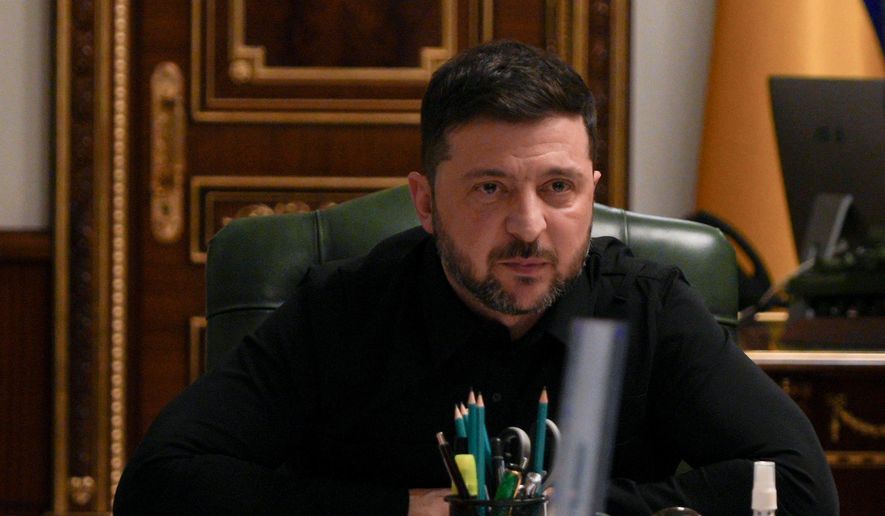A version of this story appeared in the daily Threat Status newsletter from The Washington Times. Click here to receive Threat Status delivered directly to your inbox each weekday.
KYIV, Ukraine — The timing couldn’t be worse for Volodymyr Zelenskyy: The Trump administration’s new Ukraine peace proposal, negotiated with Russia, calls for long-opposed concessions, including the ceding of territory, at perhaps the lowest point of the Ukrainian president’s political career.
Mr. Zelenskyy, struggling with low approval ratings at home and scrambling to contain a burgeoning corruption scandal that threatens to engulf his government, was set to meet “in the coming days” with Trump representatives to discuss the U.S.-drafted deal.
“We are ready now, as before, to work constructively with the American side, as well as with our partners in Europe and around the world so that the outcome is peace,” Mr. Zelenskyy said in a statement released Thursday.
The dual pressure of domestic instability and external demands has pushed the Ukrainian leadership into its most difficult strategic dilemma of the war so far.
In Kyiv, the political class views the timing of Washington’s initiative with suspicion.
Volodymyr Fesenko, a political scientist and director at the Penta Center for Political Studies in Kyiv, said the release of the proposal “is no coincidence.” He suggested that the Trump administration is seeking to leverage Mr. Zelenskyy’s weakened position.
Mr. Fesenko said the Ukrainian president faces an existential crisis: Accepting U.S. demands could destroy him politically while resisting risks the survival of Ukraine itself.
Mr. Fesenko is also skeptical of the plan’s feasibility. Some provisions, he said, are unacceptable to Ukraine, while others are incompatible with Russia’s objectives. More fundamentally, he said, the Kremlin has no incentive to negotiate seriously.
Mr. Zelenskyy and his inner circle have learned the value of deference, at least in public, to the White House. On Thursday, however, Zelenskyy adviser Mykhailo Podolyak slammed the Trump peace deal as little more than “unconditional capitulation” to Russian President Vladimir Putin.
Advantage, Russia
Mr. Putin likely feels the strategic balance shifting in his favor, either through battlefield attrition among the Ukrainians or political turmoil in Kyiv.
As long as Russian leaders remain convinced that time is on their side, they will not rush toward a negotiated settlement that limits their ambitions, Mr. Fesenko told The Washington Times. That confidence has been bolstered by the dynamic at the front.
In recent weeks, Russian forces have made important territorial gains in eastern and southern Ukraine, capturing 169 square miles over four weeks, according to independent assessments, while sustaining pressure on Ukrainian defensive lines around Pokrovsk, Kramatorsk and Sloviansk.
Though Ukraine has prevented any major breakthrough, the steady erosion of territory betrays Kyiv’s growing difficulties in finding the human resources to man its defensive lines.
Meanwhile, Russia has intensified its strategic bombing campaign. In a single overnight assault Wednesday on the western Ukrainian city of Ternopil, Moscow launched 476 drones and 48 missiles, killing at least 25 civilians and striking energy and transportation nodes in subzero temperatures.
Rail traffic across several regions has been disrupted, aggravating already fragile supply chains. The combination of front-line attrition and deep-strike attacks threatens to impose severe constraints on Kyiv’s ability to sustain the war effort through the winter.
A change in Washington
For Ukraine, Washington’s message is unmistakable: The United States is shifting from being Kyiv’s primary military backer to positioning itself as a broker of a settlement that may require painful territorial and political compromises.
Mr. Zelenskyy is caught between competing pressures, with U.S. insistence on a diplomatic settlement, domestic anger over corruption and governance, and the unrelenting military threat from Russia.
After more than three years of full-scale war, Washington now appears determined to steer the conflict toward a negotiated outcome. Whether Ukraine is ready or politically able to accept such terms is far from clear.
For Mr. Zelenskyy, the coming months may determine the contours of any peace settlement and his own political fate.
Corruption concerns
The crisis erupted early this month when the National Anti-Corruption Bureau of Ukraine announced a sweeping investigation into a bribery scheme at Energoatom, the state-owned nuclear power operator. Investigators said a “high-level criminal organization” extracted up to $100 million in kickbacks, compelling suppliers to pay bribes of 10% to 15% to secure contracts.
The government’s response was immediate: Energoatom’s supervisory board was dismissed, two Cabinet ministers were removed, and several officials were detained. The scale of the affair has fueled public outrage in a country already exhausted by war and ever more frequent energy shortages.
An October survey by the Kyiv International Institute of Sociology found that 40% of Ukrainians describe their country as “hopelessly corrupt,” a narrative that threatens to erode morale and Western confidence at a critical moment.
The scandal’s political fallout has been severe. Parliamentary debates have grown tense, and long-standing complaints about Mr. Zelenskyy’s centralization of power have resurfaced with new intensity.
Devil in the details
Washington has circulated a peace proposal widely viewed in Kyiv as deeply unfavorable to Ukraine.
The U.S. framework outlines significant Ukrainian concessions, according to multiple reports: recognition of certain territorial losses, reductions in weapons systems and limits on the size of Ukraine’s armed forces.
In exchange, Ukraine would receive security guarantees and continued Western support.
Secretary of State Marco Rubio defended the approach. He said a lasting peace requires “an extensive exchange of serious and realistic ideas” and that “both sides [must] agree to difficult but necessary concessions.”
European leaders were quick to caution against a process that sidelines them and forces Ukraine into unilateral compromise.
EU foreign policy chief Kaja Kallas said that “for any plan to work, it needs Ukrainians and Europeans on board.”
French and Polish officials warned that the terms under discussion risk an effective “capitulation” to Moscow.




Please read our comment policy before commenting.